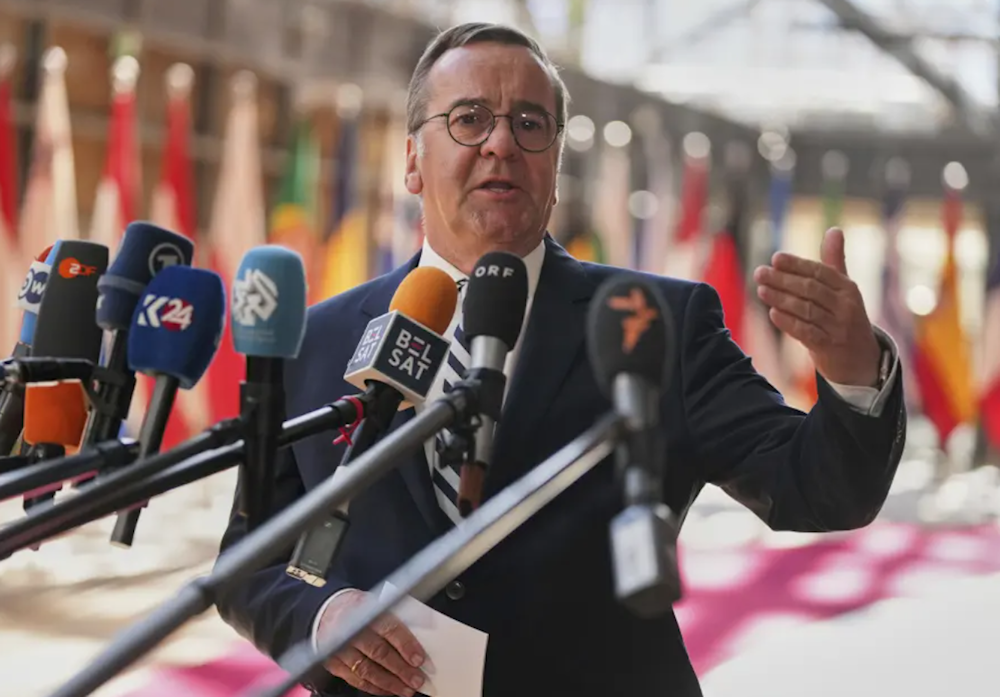Germany to deliver Patriot systems to Ukraine within days: Pistorius
On July 22, German Defense Minister Boris Pistorius stated that Berlin was prepared to send the Patriots, but only if its own arsenal could be replenished within six to eight months.
-

Germany's Defense Minister Boris Pistorius speaks with the media as he arrives for a meeting of EU defense ministers at the European Council building in Brussels on May 20, 2025 (AP)
Germany is set to deliver additional Patriot air defense systems to Ukraine in the coming days, Ukrainian Defense Minister Denis Shmyhal announced on Friday.
Earlier, Germany’s Defense Ministry confirmed that two Patriot systems would be provided to Kiev, contingent on a reciprocal agreement with the United States to supply Germany with replacement systems as soon as possible, enabling Berlin to meet its NATO commitments.
"Germany will supply Ukraine with two more Patriot systems. In the coming days, the Bundeswehr will deliver additional Patriot launchers as the first stage. At the second stage, over the next two to three months, other components of the system will be transferred," Shmyhal posted to Telegram.
Bloomberg earlier reported the deal, which marks a significant step in strengthening Ukraine’s air defense capabilities.
The delivery comes in direct response to a devastating Russian missile and drone strike on Ukraine’s capital on Thursday. Ukrainian officials confirmed that 31 people were killed, including five children, in the assault. President Volodymyr Zelenskiy also said that 159 people were injured, among them 16 children.
On July 22, German Defense Minister Boris Pistorius stated that Berlin was prepared to send the Patriots, but only if its own arsenal could be replenished within six to eight months. He also noted earlier that the U.S. had agreed to transfer five Patriot systems to Ukraine under recently concluded deals.
On July 14, former U.S. President Donald Trump declared that Washington would provide military aid to Ukraine, while European allies would shoulder the financial burden. The assistance, which he called a “very big deal,” includes billions of dollars’ worth of U.S.-made weapons, including Patriot systems. However, France, Italy, the Czech Republic, and Hungary have declined to join the initiative.
Russia has repeatedly condemned Western arms shipments to Ukraine, claiming they obstruct peace efforts and risk escalating the conflict. Foreign Minister Sergey Lavrov has warned that any military supplies headed to Ukraine are considered legitimate targets by Russian forces.
Trump’s position on aid and European burden-sharing
German Chancellor Friedrich Merz has urged Trump to continue American military assistance for Ukraine, even as the US president has reiterated his expectation that European allies should bear more of the financial burden.
While Trump has expressed willingness to support further aid, he has emphasized that European countries must step up their commitments to ensure sustained military backing for Kiev.
In addition to the two launchers, Germany announced plans to deliver further system components to Ukraine within the next two to three months. These additional assets are expected to enhance the functionality and coverage of the Patriot defense systems already deployed.
As part of the agreement, Germany will become the first country to receive the newly manufactured, latest-generation Patriot systems from the US Department of Defense. The procurement and deployment will be financed by Germany, reflecting Berlin’s growing role in supporting Ukraine’s defense infrastructure.
On a related note, two Republican senators, Roger Wicker and Jim Risch, have introduced legislation aimed at establishing a fund to expand military assistance to Ukraine, The Wall Street Journal reported on Thursday.
The proposed legislation, known as the PEACE Act, would establish a new fund that accepts financial contributions from US allies. The US Secretary of Defense would use this fund to pay defense contractors for replenishing American military stockpiles, enabling continued arms shipments to Ukraine without compromising US military readiness.
The fund is expected to receive between $5 and $8 billion annually, with Germany and the United Kingdom likely to be its primary donors. “This is the fastest way to arm Ukraine as well as to minimize the strategic and military threat posed by Russia to the US and NATO,” Wicker told the WSJ.
Meanwhile, on July 14, US President Donald Trump stated that the US would impose 100% tariffs on Russian imports and introduce tariffs on countries that continue buying Russian oil if a ceasefire is not reached between Moscow and Kiev.

 4 Min Read
4 Min Read










